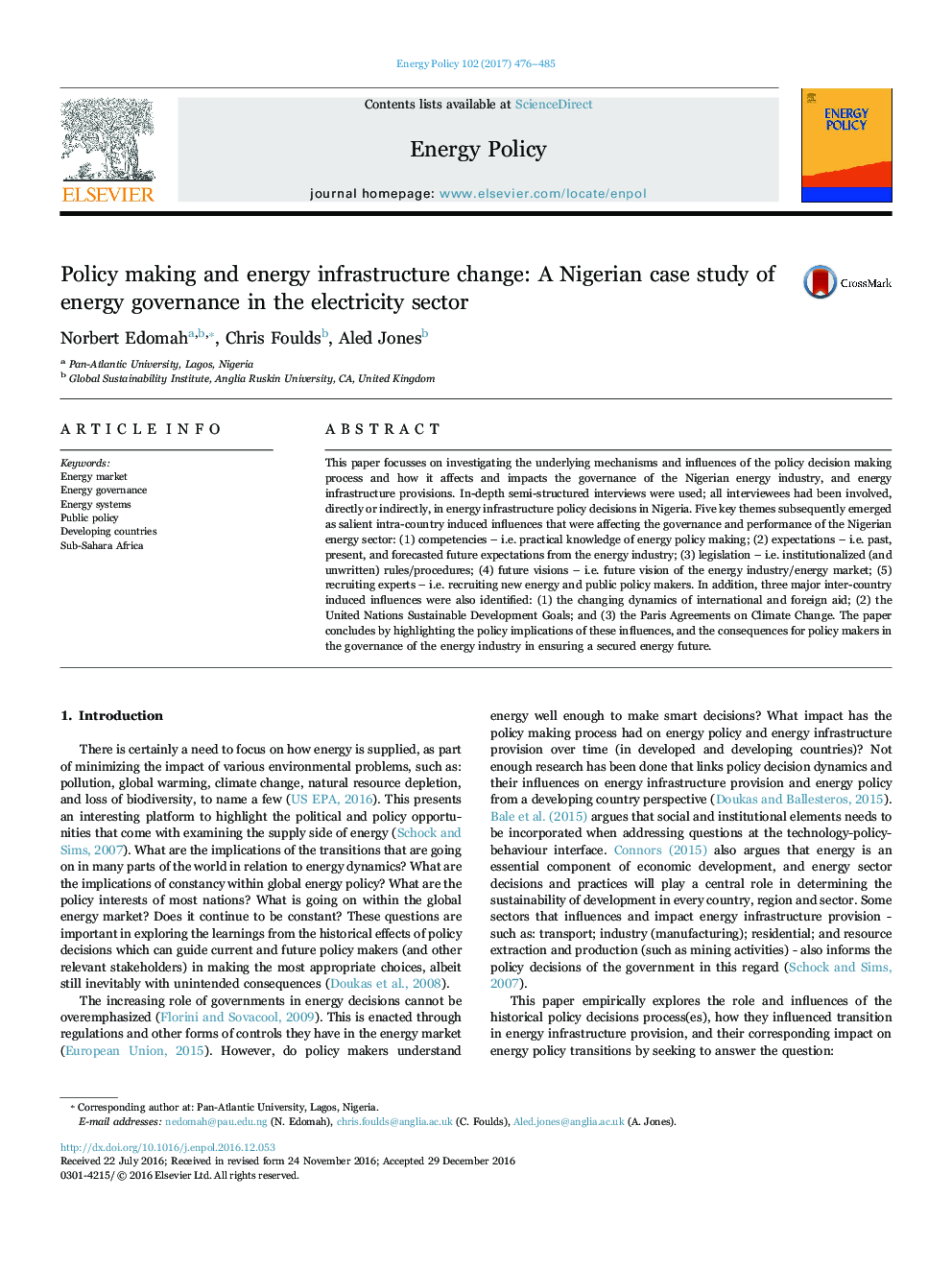| کد مقاله | کد نشریه | سال انتشار | مقاله انگلیسی | نسخه تمام متن |
|---|---|---|---|---|
| 5106192 | 1481256 | 2017 | 10 صفحه PDF | دانلود رایگان |
عنوان انگلیسی مقاله ISI
Policy making and energy infrastructure change: A Nigerian case study of energy governance in the electricity sector
ترجمه فارسی عنوان
سیاست گذاری و تغییر زیرساخت های انرژی: مطالعه موردی نیجریه در مورد مدیریت انرژی در بخش برق
دانلود مقاله + سفارش ترجمه
دانلود مقاله ISI انگلیسی
رایگان برای ایرانیان
کلمات کلیدی
بازار انرژی، مدیریت انرژی، سیستم های انرژی، سیاست عمومی، کشورهای در حال توسعه، زیر صحرا آفریقا،
ترجمه چکیده
این مقاله بر بررسی مکانیزم های درونی و تأثیرات فرایند تصمیم گیری سیاست ها و تأثیر آن بر مدیریت انرژی نیجریه و مقررات زیربنایی انرژی تمرکز دارد. مصاحبه های عمیق نیمه ساختار یافته استفاده شد؛ تمام مصاحبه شوندگان به طور مستقیم یا غیرمستقیم در تصمیم گیری های سیاست انرژی زیربنایی در نیجریه دخیل بودند. سپس پنج موضوع کلیدی به عنوان مهمترین تاثیرات ناشی از درگیری در داخل کشور که بر حاکمیت و عملکرد بخش انرژی نیجریه تأثیر می گذارد، ظهور کردند: (1) صلاحیت ها - یعنی دانش عملی در زمینه ایجاد سیاست های انرژی؛ (2) انتظارات - یعنی گذشته، حال، و پیش بینی های انتظارات آینده از صنعت انرژی؛ (3) قوانین - به عنوان مثال قوانین / روش های نهادینه شده (و غیر روایت)؛ (4) چشم انداز های آینده - به عنوان مثال چشم انداز آینده از صنعت انرژی / بازار انرژی؛ (5) استخدام کارشناسان - یعنی استخدام نیروهای جدید و سیاست گذاران عمومی. علاوه بر این، سه مؤلفه اصلی بین الملل نیز شناسایی شدند: (1) پویایی در حال تغییر کمک های بین المللی و خارجی؛ (2) اهداف توسعه پایدار ملل متحد؛ و (3) توافقنامه پاریس در مورد تغییرات اقلیمی. این مقاله با تأکید بر پیامدهای سیاستهای این تأثیرات و پیامدهای آن برای سیاستگذاران در حاکمیت صنعت انرژی در تأمین آینده انرژی امن، نتیجه گیری می کند.
موضوعات مرتبط
مهندسی و علوم پایه
مهندسی انرژی
مهندسی انرژی و فناوری های برق
چکیده انگلیسی
This paper focusses on investigating the underlying mechanisms and influences of the policy decision making process and how it affects and impacts the governance of the Nigerian energy industry, and energy infrastructure provisions. In-depth semi-structured interviews were used; all interviewees had been involved, directly or indirectly, in energy infrastructure policy decisions in Nigeria. Five key themes subsequently emerged as salient intra-country induced influences that were affecting the governance and performance of the Nigerian energy sector: (1) competencies - i.e. practical knowledge of energy policy making; (2) expectations - i.e. past, present, and forecasted future expectations from the energy industry; (3) legislation - i.e. institutionalized (and unwritten) rules/procedures; (4) future visions - i.e. future vision of the energy industry/energy market; (5) recruiting experts - i.e. recruiting new energy and public policy makers. In addition, three major inter-country induced influences were also identified: (1) the changing dynamics of international and foreign aid; (2) the United Nations Sustainable Development Goals; and (3) the Paris Agreements on Climate Change. The paper concludes by highlighting the policy implications of these influences, and the consequences for policy makers in the governance of the energy industry in ensuring a secured energy future.
ناشر
Database: Elsevier - ScienceDirect (ساینس دایرکت)
Journal: Energy Policy - Volume 102, March 2017, Pages 476-485
Journal: Energy Policy - Volume 102, March 2017, Pages 476-485
نویسندگان
Norbert Edomah, Chris Foulds, Aled Jones,
